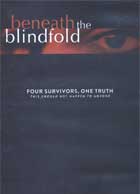
Beneath the Blindfold 2012
Distributed by Beneath the Blindfold
Produced by Kathy Berger & Ines Sommer
Directed by Ines Sommer & Kathy Berger
DVD , color, 55 min.
College - General Adult
Acting, Activism, Human Rights, Protest Movements, Torture, War Crimes
Date Entered: 06/06/2014
Reviewed by Brian Boling, Temple University LibrariesBeneath the Blindfold is a character-driven portrait of four extraordinary survivors of torture, one that isn’t afraid to tell stories and name names. One survivor, Hector Aristizabal, teaches acting classes and performs a one-man play about his experience. Another, Dr. Matilde de la Sierra, was tortured for providing medical care to the Mayan population in Guatemala. She now speaks out against CIA training of Latin American military officers conducted at the infamous School of the Americas. A third survivor, former Iraq security contractor Donald Vance, filed a (dismissed) lawsuit against Donald Rumsfeld for his role in drafting America’s torture policy.
As few torture survivors have become comfortable discussing their experiences, the filmmakers’ decision to focus on these remarkably strong and outspoken survivors makes sense. However, the clear political agenda advanced by the film may cause unreceptive viewers to tune out. [Full disclosure: I participated in 2010’s SOA Watch march in Columbus, Georgia.] Ben Achtenberg’s Refuge, a recent film about counseling of torture survivors in general, might foster greater overall empathy in viewers, as they can separate their political preconceptions from the concept of torture itself.
Nonetheless, the film does provide an engaging entry point for introductory classes that discuss torture in general. The pacing is good for a class-length film and touches such as archival footage of Dr. Donald Hebb’s experiments on sensory deprivation show great cinematic craft. Hector’s performance of his trauma may even be of interest to theater professors. And the film is a must-have for Divinity School libraries in research institutions. One disappointment is that, while the bulk of refugee dialogue is subtitled, other English speakers are not, and the absence of captions renders these interviews inaccessible to the hearing-impaired.